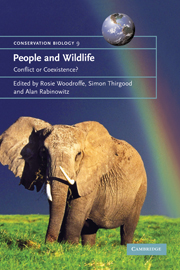Book contents
- Frontmatter
- Contents
- List of contributors
- Foreword
- Acknowledgements
- 1 The impact of human–wildlife conflict on natural systems
- 2 The impact of human–wildlife conflict on human lives and livelihoods
- 3 Characterization and prevention of attacks on humans
- 4 Non-lethal techniques for reducing depredation
- 5 Techniques to reduce crop loss: human and technical dimensions in Africa
- 6 Evaluating lethal control in the management of human–wildlife conflict
- 7 Bearing the costs of human–wildlife conflict: the challenges of compensation schemes
- 8 Increasing the value of wildlife through non-consumptive use? Deconstructing the myths of ecotourism and community-based tourism in the tropics
- 9 Does extractive use provide opportunities to offset conflicts between people and wildlife?
- 10 Zoning as a means of mitigating conflicts with large carnivores: principles and reality
- 11 From conflict to coexistence: a case study of geese and agriculture in Scotland
- 12 Hen harriers and red grouse: the ecology of a conflict
- 13 Understanding and resolving the black-tailed prairie dog conservation challenge
- 14 People and elephants in the Shimba Hills, Kenya
- 15 Safari hunting and conservation on communal land in southern Africa
- 16 Socio-ecological factors shaping local support for wildlife: crop-raiding by elephants and other wildlife in Africa
- 17 Jaguars and livestock: living with the world's third largest cat
- 18 People and predators in Laikipia District, Kenya
- 19 Searching for the coexistence recipe: a case study of conflicts between people and tigers in the Russian Far East
- 20 A tale of two countries: large carnivore depredation and compensation schemes in Sweden and Norway
- 21 Managing wolf–human conflict in the northwestern United States
- 22 Policies for reducing human–wildlife conflict: a Kenya case study
- 23 An ecology-based policy framework for human–tiger coexistence in India
- 24 The future of coexistence: resolving human–wildlife conflicts in a changing world
- References
- Index
7 - Bearing the costs of human–wildlife conflict: the challenges of compensation schemes
Published online by Cambridge University Press: 23 November 2009
- Frontmatter
- Contents
- List of contributors
- Foreword
- Acknowledgements
- 1 The impact of human–wildlife conflict on natural systems
- 2 The impact of human–wildlife conflict on human lives and livelihoods
- 3 Characterization and prevention of attacks on humans
- 4 Non-lethal techniques for reducing depredation
- 5 Techniques to reduce crop loss: human and technical dimensions in Africa
- 6 Evaluating lethal control in the management of human–wildlife conflict
- 7 Bearing the costs of human–wildlife conflict: the challenges of compensation schemes
- 8 Increasing the value of wildlife through non-consumptive use? Deconstructing the myths of ecotourism and community-based tourism in the tropics
- 9 Does extractive use provide opportunities to offset conflicts between people and wildlife?
- 10 Zoning as a means of mitigating conflicts with large carnivores: principles and reality
- 11 From conflict to coexistence: a case study of geese and agriculture in Scotland
- 12 Hen harriers and red grouse: the ecology of a conflict
- 13 Understanding and resolving the black-tailed prairie dog conservation challenge
- 14 People and elephants in the Shimba Hills, Kenya
- 15 Safari hunting and conservation on communal land in southern Africa
- 16 Socio-ecological factors shaping local support for wildlife: crop-raiding by elephants and other wildlife in Africa
- 17 Jaguars and livestock: living with the world's third largest cat
- 18 People and predators in Laikipia District, Kenya
- 19 Searching for the coexistence recipe: a case study of conflicts between people and tigers in the Russian Far East
- 20 A tale of two countries: large carnivore depredation and compensation schemes in Sweden and Norway
- 21 Managing wolf–human conflict in the northwestern United States
- 22 Policies for reducing human–wildlife conflict: a Kenya case study
- 23 An ecology-based policy framework for human–tiger coexistence in India
- 24 The future of coexistence: resolving human–wildlife conflicts in a changing world
- References
- Index
Summary
INTRODUCTION
As the cases in this volume vividly illustrate, human conflict with wildlife is a significant – and growing – conservation problem around the world. The risk of wildlife damage to crops, livestock and human lives provides incentives for rural residents to kill wildlife and to reduce the quantity and quality of habitat on private and communal lands.
Recognition among conservationists that the cost of conserving large and sometimes dangerous animals is often borne disproportionately by farmers and others living closest to wildlife has spawned strategies to reduce this imbalance. One popular response is to compensate rural residents for the costs of wildlife damage. By spreading the economic burden and moderating the financial risks to people who coexist with wildlife, conservationists hope to reduce the negative consequences of human–wildlife conflict.
Few systematic efforts have been made to evaluate the efficacy of these programmes or the best way to implement and manage these schemes for endangered species (Sillero-Zubiri and Laurenson 2001). In this chapter, we build on our recent study (Nyhus et al. 2003) which asked whether compensation programmes really help endangered species in conflict with humans. We surveyed 23 international experts in large mammal conservation to learn about common pitfalls associated with running a compensation programme and the resources that managers need to succeed. Here, we also draw on additional published studies and reviews to explore the role of compensation in resolving conflicts between people and wildlife.
- Type
- Chapter
- Information
- People and Wildlife, Conflict or Co-existence? , pp. 107 - 121Publisher: Cambridge University PressPrint publication year: 2005
- 101
- Cited by



